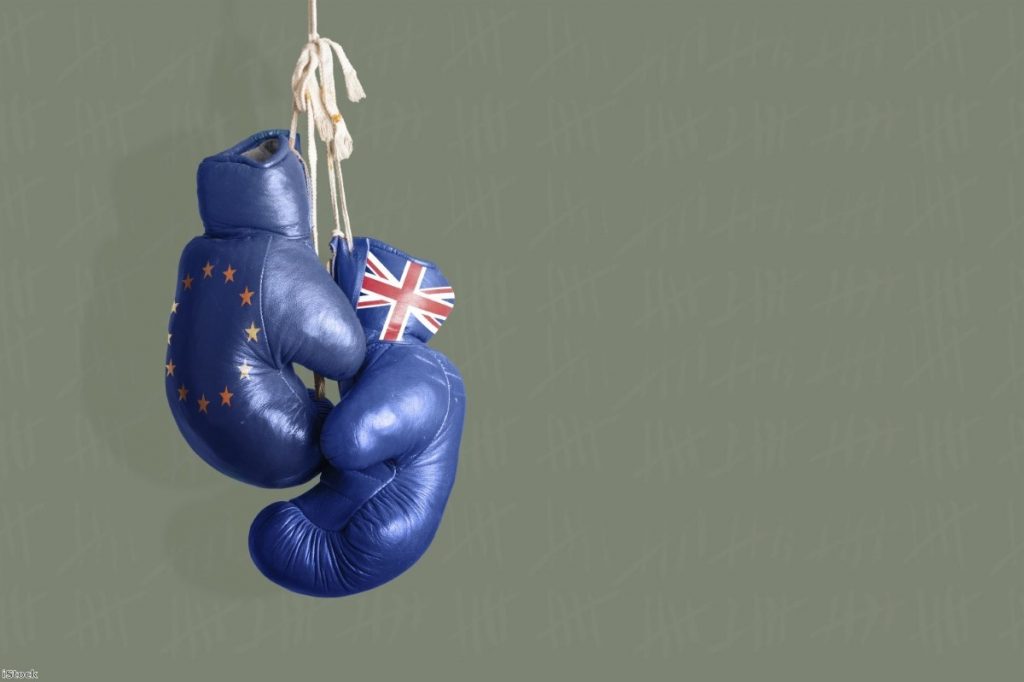By Edward McMillan-Scott
The gloves are off as the Brexit process finally moves from stagey diplomacy to a tussle for public opinion. The EU Commission's intervention this week was not aimed primarily at the UK but at France, where one of the founding countries of the European project holds a decisive run-off on Sunday.
The acrimonious TV debate on Wednesday night between Marine le Pen threatening 'Frexit' and pro-EU Emmanuel Macron became not just personal but abusive. France matters deeply: as Newsweek put it this week, "Victory for Le Pen—unlikely but still possible—would represent an existential crisis for the EU."
I observed the 2002 presidential election when le Pen's father had made it to the run-off with Jacques Chirac, who received over 82% of the vote as the old party system united against the neo-fascist Holocaust-denier. That election was part of the process of making nationalist populism credible.


After this week's epic TV debate, viewers rated Macron the winner and the opinion polls for Sunday – as France goes into pre-election campaigning and polling purdah tonight – give him a steady lead of some 60-40% of those intending to vote. Abstentions are forecast at around 15% of the population.
But can the polls be trusted when hidden social media and post-truth politics now play such a role, as in the Brexit vote?
One factor which cannot be ignored in Britain's 'Brexit general election' is the inability of the contemporary Conservative leadership to fully understand continental – or even Irish – priorities and sensibilities. Writing earlier this week for the New Statesman, Stephen Bush's article was headlined 'Why a 2005 promise by David Cameron could spell disaster for Theresa May and Brexit', referring to Cameron's pledged divorce from the European centrist mainstream European People's Party (EPP). Bush wrote:
"Being a member of the European Union has long allowed Britain to ignore its neighbours. Even among the most cosmopolitan Britons, political events across the sea have rarely registered beyond a murmur.
"But now, perhaps for the first time during Britain's four-decade membership of the EU, a newspaper in another European country has set the political agenda here, leaving the BBC and other media outlets scrambling to catch up. On 1 May, five days after a dinner at 10 Downing Street between European Commission president Jean-Claude Juncker and Theresa May, the German newspaper Frankfurter Allgemeine Zeitung (FAZ) published a detailed account of what took place behind the black door."
To be honest, it caught me out too, and it was Henry Porter, who is organising the Convention on Brexit and the Political Crash at Central Hall this month, who said to me that those revelations from Theresa May's dinner table could signal the start of a possible constitutional crisis in the UK– part of the unfolding 'political crash' in Western society which is highlighted by the Brexit result last June and Trump's win in November, and still, conceivably, a win by le Pen.

As the results of the UK's local elections begin to pour in this morning, it is clear that Jean-Claude Juncker's role in the leaks has so far been turned to advantage by Theresa May, with significant wins for the Conservatives. An attempt by Donald Tusk, speaking on behalf of the EU27, to urge "discretion, moderation and mutual respect" was met with scorn by the hard Brexiters in London.
Daniel Hannan, the architect not only of the Tory split from the EPP but who also led the lobby for a referendum and was a key player in the Leave campaign, wrote in the Sun that the Brexit talks might fail because of Juncker's intervention. Hannan pointed out that Juncker had been appointed to head the Commission despite "frantic opposition" from David Cameron, without realising that, thanks to his machinations, the PM had no allies.
As Cameron's former political adviser Daniel Korski wrote in a valedictory article:
"Not being in the EPP meant that Cameron could not benefit from the traditional pre-Council EPP huddle of European leaders, where he could lobby his counterparts and understand, in a more informal setting, what their mood was."
Now it is Theresa May's turn to misunderstand the continental mindset, and she has no continental buddies either. Her dinner table included the EU's appointed Brexit negotiator Frenchman Michel Barnier, an affable and experienced politician, twice a European Commissioner and France's former foreign minister, a vice-president of the EPP party and one of the few French politicians to use English routinely. But his focus is on France and his career depends on a Macron win. Indeed, he tweeted a short video message of support for him yesterday.
Dimanche, je voterai pour @EmmanuelMacron. Pour réformer l'Europe de l'intérieur. Pour une France forte et européenne. pic.twitter.com/KMzkrIXtCi
— Michel Barnier (@MichelBarnier) May 4, 2017
Tellingly, key parts of Barnier's speech outlining the EU's tough formal negotiating mandate with the UK on Wednesday were delivered in French, "pour décourager les autres", no doubt.
One Conservative at least who is in a good position to advise May on the French outcome is her ambassador to France, one Ed (now Lord) Llewellyn, Cameron's former chief of staff, who genuinely does understand continental politics.
Edward McMillan-Scott was a UK MEP 1984-2014 and European parliament vice-president 2004-2014. A former leader of the Conservative MEPs, he opposed David Cameron's split from the mainstream EPP Group in 2009 and sat as a LibDem until 2014. He is a patron of the non-party European Movement and is a committee member of the Convention on Brexit
The opinions in politics.co.uk's Comment and Analysis section are those of the author and are no reflection of the views of the website or its owners.












